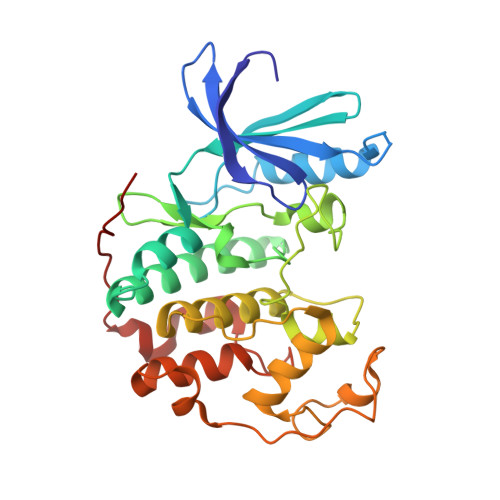Discovery and Characterisation of 2-Anilino-4-(Thiazol-5-Yl)Pyrimidine Transcriptional Cdk Inhibitors as Anticancer Agents
Wang, S., Griffiths, G., Midgley, C.A., Barnett, A.L., Cooper, M., Grabarek, J., Ingram, L., Jackson, W., Kontopidis, G., Mcclue, S.J., Mcinnes, C., Mclachlan, J., Meades, C., Mezna, M., Stuart, I., Thomas, M.P., Zheleva, D.I., Lane, D.P., Jackson, R.C., Glover, D.M., Blake, D.G., Fischer, P.M.(2010) Chem Biol 17: 1111
- PubMed: 21035734
- DOI: https://doi.org/10.1016/j.chembiol.2010.07.016
- Primary Citation of Related Structures:
2XMY, 2XNB - PubMed Abstract:
The main difficulty in the development of ATP antagonist kinase inhibitors is target specificity, since the ATP-binding motif is present in many proteins. We introduce a strategy that has allowed us to identify compounds from a kinase inhibitor library that block the cyclin-dependent kinases responsible for regulating transcription, i.e., CDK7 and especially CDK9. The screening cascade employs cellular phenotypic assays based on mitotic index and nuclear p53 protein accumulation. This permitted us to classify compounds into transcriptional, cell cycle, and mitotic inhibitor groups. We describe the characterization of the transcriptional inhibitor class in terms of kinase inhibition profile, cellular mode of action, and selectivity for transformed cells. A structural selectivity rationale was used to optimize potency and biopharmaceutical properties and led to the development of a transcriptional inhibitor, 3,4-dimethyl-5-[2-(4-piperazin-1-yl-phenylamino)-pyrimidin-4-yl]-3H-thiazol-2-one, with anticancer activity in animal models.
- Cyclacel Limited, Dundee DD15JJ, Scotland, UK.
Organizational Affiliation:

















